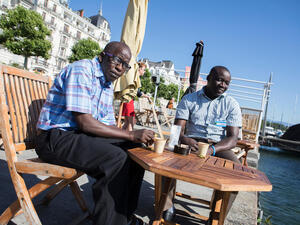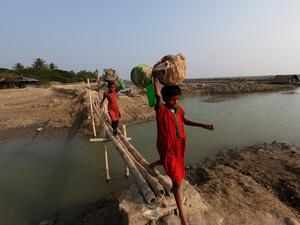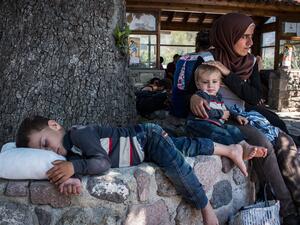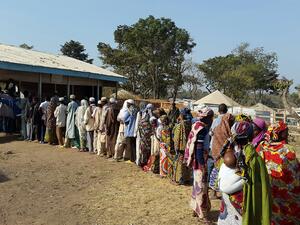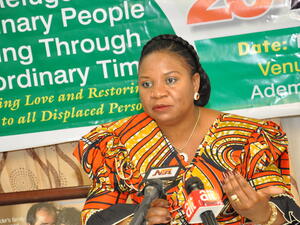Q&A: Legendary British runner and politician recalls World Refugee Year
Q&A: Legendary British runner and politician recalls World Refugee Year

Sir Christopher Chataway holds the Nansen Medal that he won for his role in organizing World Refugee Year.
LONDON, United Kingdom, May 29 (UNHCR) - Sir Christopher Chataway first came to world attention in 1952, when he fell on the last turn of the 5,000 metres final in the Helsinki Olympic Games while vying for the lead with the legendary Czech runner, Emil Zátopek. Two years later, Sir Chris broke the 5,000 metres world record while narrowly beating the Soviet runner Vladimir Kuts at London's White City stadium. In the late 1950s he embarked on a political career after a spell in broadcasting and in 1958 he became a Conservative Party member of parliament and also helped launch the phenomenally successful initiative that became World Refugee Year (WRY). Launched in July 1959 and lasting until June 30 of the following year, this British-led initiative spread awareness about refugees across the continents, led to solutions for many in Europe and Asia and raised the equivalent of more than US$600 million in today's money. Britain and many other governments supported the initiative but the communist world ignored it. The UN refugee agency also played a pivotal role and the campaign helped to enhance its role, but much of the work was done by non-governmental organizations, secular and faith-based. Events were widespread and varied and many celebrities contributed. Sir Chris and three other Britons were awarded the Nansen Refugee Award in 1960 for their crucial role in getting World Refugee Year off the ground. He later pursued a successful political career, including stints as the UK's Minister of Posts and Telecommunications and Minister of Industry. He left politics in 1974 and went into the business world, but maintained an interest in humanitarian affairs as a trustee of ActionAid, which fights against poverty and injustice. Sir Chris spoke recently at his London home with UNHCR Web Editor Leo Dobbs. Excerpts from the interview:
Where and when did the idea for World Refugee Year come?
It came from Tim Raison, who was a friend of mine and, like me, wanted to be a Conservative member of parliament. [Former cabinet minister Raison died in 2011.] He was at that time editor of Crossbow, which was the journal of the Bow Group - an organization for younger conservatives. He floated the idea past me and I thought it was terrific. He, I and two other journalists, Trevor Philpott and Colin Jones, wrote an article [in the Spring 1958 edition of Crossbow entitled "A Plan to Save the Refugees"] which was the start of the idea. The Second World War had been over for 15 years and people had just got used to the fact that there were hundreds of thousands of refugees, most of them living in miserable conditions. There was a feeling that a very limited amount was being done for them. We felt that there was a possibility to galvanize interest worldwide, particularly focusing on the idealism of the young because older people who had been through the war were inclined, perhaps, to shrug their shoulders and say: "Well, too bad."
What were the aims?
The aims were to resettle a lot of refugees and to rekindle and arouse interest in their plight, and to raise money. In order to achieve the first objective, actually resettling them, it was necessary to raise money. That would be initially from the public and voluntary organizations, but we were trying also very hard to get governments to contribute to the campaign.
What were the refugee crises at that time?
World Refugee Year was not provoked by a crisis . . . but the areas where there were continuing refugee problems included Europe. There were large numbers of people, including survivors of concentration camps, living in refugee camps - some of them pretty unpleasant. And the Middle East, with the Arab-Israeli conflict, produced a lot of refugees who had no particular prospect of being resettled. Then Hong Kong. There was still a big influx of refugees coming out of China and also other parts of the Far East. Those were the three areas that we had in mind.
Who was behind the organization? Did you create a global organization?
We did. We first of all concentrated on getting the British government behind it. It was not too long after Suez [canal crisis] and so Britain's name internationally was not as sweet-smelling as it might be. There were at least some in the Foreign Office who were very keen on the idea. David Ormsby-Gore was our champion, he was minister of state [for foreign affairs]. He was extremely helpful. There was a good deal of opposition within the government. The Treasury weren't very keen to open up another way of spending money. The Home Office were distinctly unenthusiastic. In fact completely opposed because they thought it would mean more refugees being brought into Britain. Those were the main players. The media didn't leap onto it and say, 'What a wonderful idea." But as the months went by and we kept up the pressure, gradually the media came onside and were helpful.
Then it spread beyond the UK?
I think one of the next steps was that the British government proposed it at the UN General Assembly [in December 1958] and although China and Russia voted against, it had overwhelming support.
Were you in touch with other organizations overseas?
Once it was adopted by the UN General Assembly, I was asked to speak in a number of bodies abroad trying to galvanize support. I remember Canada particularly. Gradually people came on board and a lot of governments . . . donated money . . . It was a lot of money and it really was quite successful. [British academic Peter Gatrell, in a 2011 book on World Refugee Year, wrote that it raised around US$92 million, or about US$620 million at today's prices. He said more than half, US$57 million, was donated by private individuals or associations.]
In my old age, thinking of the various things I have done, bad and good, on the whole seconding Tim Raison in this venture is about the best thing I have done.
Aside from governments, who supported the initiative?
The leading voluntary bodies. They were principally secular organizations, but the churches were very helpful. We had a lot fund-raising efforts all over the country and churches were very often at the centre of that. I remember there were hundreds of towns and villages [taking part] . . . It's a long time ago, but I remember that wonderful actress, Ingrid Bergman, supported it. [Other celebrities working directly with UNHCR included actors Yul Brynner and Brigitte Bardot, musician Larry Adler and artist Ronald Searle. Europe's royal families also endorsed WRY, including Queen Elizabeth II.]
Was there any opposition to World Refugee Year?
None of the Eastern Bloc joined. I think they weren't even pretending that they minded about refugees from the Second World War. But a very large number of the refugees would have been escaping from communism - in China and Eastern Europe. That was played down. We didn't do the politics of it at all. The Labour Party were in Britain, fully on board and tremendously supportive of World Refugee Year.
I don't think China and the Soviet Union were actively opposed. They weren't prepared to support it, but I don't recall that there was fierce opposition.
What were the main challenges?
Apathy would have been the biggest challenge. Refugees had been around for a long time and quite a lot was going on in the world that was creating more refugees. Why should we get involved? That attitude was the biggest opposition.
Would you say it was a success overall?
I'm obviously not the most dispassionate assessor of the situation, but I thought it was a success. The figures that Gatrell produces are quite strong evidence of that.
It raised money, but did it contribute to solutions for refugees?
I think that it helped to create a public attitude that was more sympathetic to refugees. In the United States, although they took very little part in it, they increased quite significantly the quota of refugees that they were prepared to take. The same happened in the United Kingdom; we took more, despite the Home Office. I think that the change in attitude would have helped other countries to do more.
I don't think I ever felt we had altered the attitude to refugees forever or that it had a huge impact on public opinion in a lasting way. But it had a surprisingly big impact in that year and it probably lasted for a year or two afterwards, with a bit more interest and a bit more sympathy.
I remember that we had as an objective not only to close the refugee camps in Europe, which was more or less done - and I think World Refugee Year played a large part in that . . . A lot happened in Hong Kong [to improve the situation for refugees and move them to better accommodation]. In the Middle East, it didn't result in much in the way of closure of camps because there were continuing political difficulties and strife.
Did UNHCR play a big role?
Oh yes. The person I saw most of was Peter Casson [UNHCR's special representative in Canada]. He was terrific. He helped us greatly to get the thing going in Britain. And I think he played a large part buzzing around the world afterwards. He was a bundle of energy and full of ideas, galvanizing new supporters. From what I saw, he and UNHCR really did a lot . . . From my vantage point UNHCR was right at the front of most of the initiatives. [Casson also won US$30,000 for the cause after challenging a Calgary oil millionaire to arm wrestling, neglecting to inform his opponent that he had been an amateur ring wrestler for almost 20 years.]
What did it mean to win the Nansen Refugee Award and the medal?
I was very pleased. I'd never heard of it before. I had heard of Nansen. I was thrilled and I've still got the medal on my desk.
Finally, tell us about that moment in Helsinki when gold beckoned:
Coming off the last bend of 12-and-a-half laps, I was level with the great Zátopek and then I hit my foot on the raised kerb and came crashing down. I wouldn't have won I don't think . . . In all, I suppose I ran in British teams for seven years. I ran with Roger Bannister and paced him when he did the first sub four-minute mile. It was a big part of my life.

